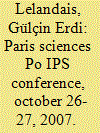| Srl | Item |
| 1 |
ID:
084542


|
|
|
|
|
| Publication |
2008.
|
| Summary/Abstract |
Humanitarian reconstruction after a large-scale natural disaster has become a key site of international politics; a site where global assumptions, relationships, and responsibilities are negotiated, solidified and questioned. While post-crisis response strategies and institutional practices have strong spatial and material characteristics, these are rarely considered as significant-either to the reconstruction effort, or to international politics more generally. This article identifies and examines the "auxiliary space" created by the everyday practices of international aid workers and asks whether its effects may lead to unanticipated and potentially transformative outcomes not only for the reconstruction effort, but also for global North-South relations at large. The article concludes that post-crisis reconstruction sites may offer both cautionary and emancipatory potential for the evolution of international relations.
|
|
|
|
|
|
|
|
|
|
|
|
|
|
|
|
| 2 |
ID:
084539


|
|
|
|
|
| Publication |
2008.
|
| Summary/Abstract |
The Global War on Terror (GWOT), framed as conflict with groups and individuals determined to disrupt and destroy "critical infrastructures," is heavily dependent on technological and psychological discourses and practices to find terrorists and their plots.1 These methods seek to protect the material "backbone" of contemporary society and to detect those individuals whose capabilities might progress to action. Yet, the social nature of all action suggests that "critical infrastructure is people," and that surveillance cannot, by itself, determine who might act and who will not. The ultimate purpose and effect of the GWOT is better understood as involving the transformation of individual mentalities, so that "heretical" thoughts and practices become impossible.
|
|
|
|
|
|
|
|
|
|
|
|
|
|
|
|
| 3 |
ID:
084543


|
|
|
|
|
| Publication |
2008.
|
| Summary/Abstract |
The joint IPS conference that took place last October 26-27, 2007 at CERI-Sciences Po (Paris) was organized in the broader scope of the launching of International Political Sociology (IPS) in Europe. The conference also aimed at launching an innovative research dynamic among international researchers who are members of the International Political Sociology editorial board and members of the COST network. It was the occasion to discuss the theoretical and empirical innovation in the field of international relations IPS would like to encourage as well as the editorial orientations the journal may take, and cross visions.
|
|
|
|
|
|
|
|
|
|
|
|
|
|
|
|
| 4 |
ID:
084540


|
|
|
|
|
| Publication |
2008.
|
| Summary/Abstract |
This article is a contribution to the theorization of global maritime circulation as a key category of a global biopolitics of security. It seeks to advance knowledge on the ways in which liberal life is promoted and protected by exacerbating global circulation. It focuses on the security effects of a complex maritime insurance apparatus driven by global insurance in which the Joint War Committee of the Lloyd's Market Association and the International Underwriting Association plays a pivotal role. Through the analysis of the inclusion of the Strait of Malacca in the Lloyd' War List in 2006 under the argument of heightened piracy, it is argued that global maritime insurance performs a special security role, that of stewardship, in securing the circulation of the high seas.
|
|
|
|
|
|
|
|
|
|
|
|
|
|
|
|
| 5 |
ID:
084537


|
|
|
|
|
| Publication |
2008.
|
| Summary/Abstract |
The article deals with the normative lessons that political scientists can learn from ethnology's experiences with ethnography. Ethnographic methods like participant observation differ significantly from other methods since they explicitly blur the boundary between theory and practice; this blurring requires researchers to carefully evaluate their conflicting responsibilities to the people studied, to the scientific community, and to themselves. Many of the insights generated in ethnology are relevant for political scientists, too, especially for those political scientists who are prepared to "leave the veranda" and want to put ethnographic methods to use, but also for those who prefer to remain in the position of an "armchair" researcher.
|
|
|
|
|
|
|
|
|
|
|
|
|
|
|
|